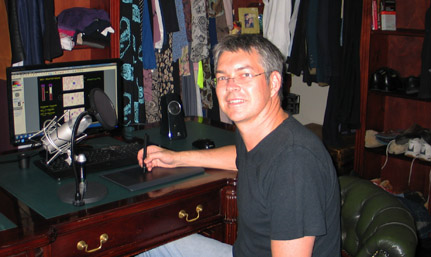|

|
Prof Vernon Louw recording his lessons in his ‘studio’
Photo: Supplied
05 March 2013 |
A professor, and lecturer, at the University of the Free State (UFS) nowadays gives ‘class’ in his sleep and from within his walk-in closet.
Prof Vernon Louw from the Department of Internal Medicine at the Faculty of Health Sciences recently began to make video recordings in which he presents his lessons in his discipline of Internal Medicine and Haematology.
In the mean time, due to the lack of a studio, he does his recordings in his walk-in closet where it is soundproof.
“I started the videos as a personal initiative, since there is great potential to create a completely integrated platform from where the students can watch the videos in their own time. It also provides us with more time to work interactively with our students in the class, since they already watched the videos on their own or can perhaps watch it later.”
The videos, which are viewable on Youtube under the name ‘Vernon Louw – MedEd’, are very specific and concepts are explained step by step with the objective of mastering them in ten-minute videos. There are already five videos uploaded and students from over the world can view them.
“The benefit is that now I can ‘lecture’ while I sleep. It is wonderful to notice in the mornings that another 20 viewers somewhere in the world joined.”
Prof Louw says that most of the videos are currently watched by mainly South-African, American, Indian and British viewers.
The videos can be watched on the Youtube channel: Vernon Louw MedEd